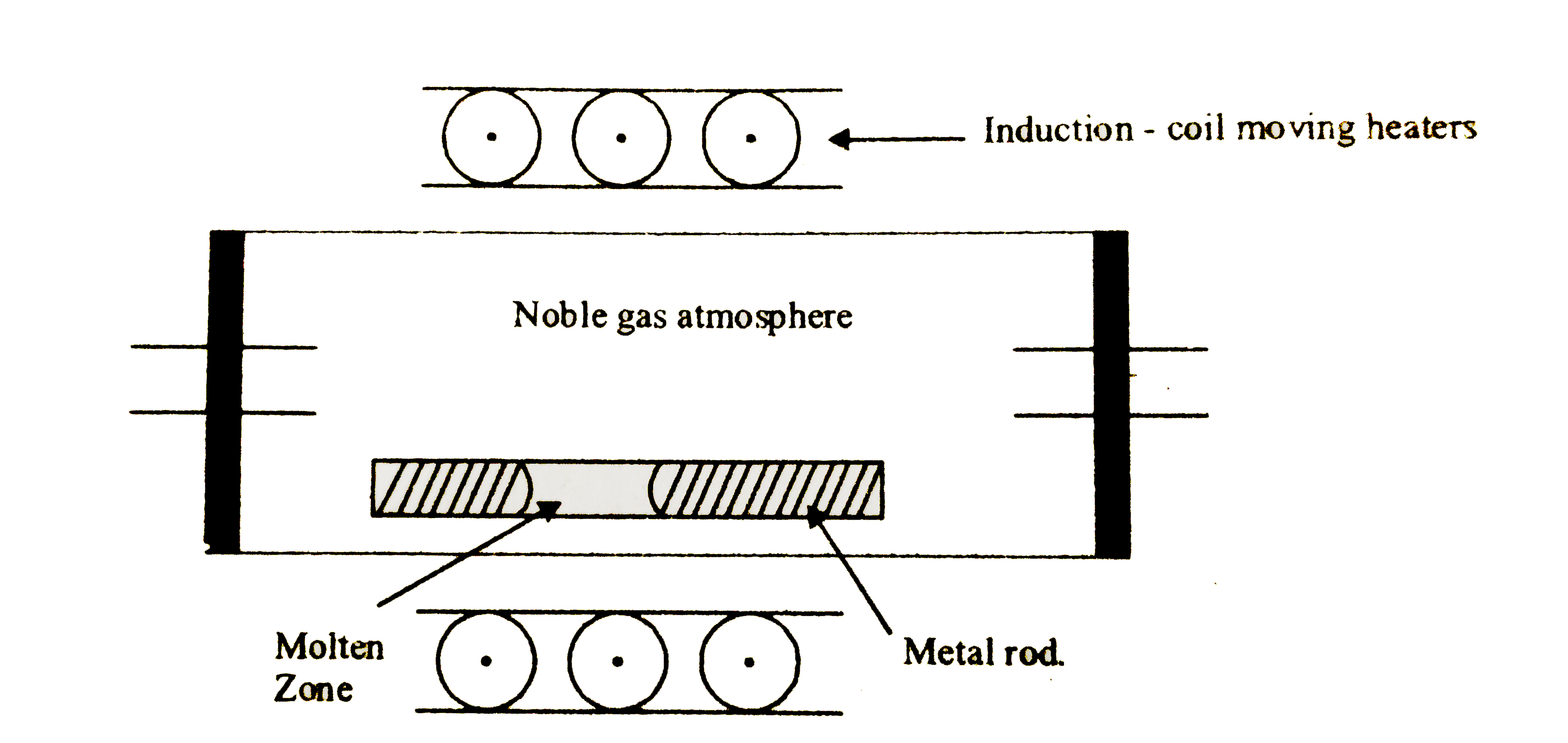Outline the principles of refining of metals by the following methods :
(a) Electrolytic refining
(b) Zone refining
(c) Vapour phase refining
Video Solution
Text Solution
(a) The crude metal is refined by electrolysis. It is carried out in an electrolytic cell containing aqueous solution of the salts of the metal of interest. The rods of impure metal are used as anode and thin strips of pure metal are used as cathode. The metal of interest dissolves from the anode, pass into the solution while the same amount of metal ions from the solution will be deposited at the cathode. During electrolysis, the less electropositive impurities in the anode, settle down at the bottom and are removed as anode mud.
(b) Zone refining: This method is based on the principle that the impurities are more soluble in the melt than in the solid state of the metal. A circular mobile heater is fixed at one end of the rod of the impure metal. The molten zone moves along with the heater which is moved forward. As the heater moves forward, the pure metal crystalises out of melt and the impurities pass on into the adjacent molten zone. This process is repeated several times and the heater is moved in the same direction. At one end, impurities get concentrated.

This method is very useful for producing semiconductor and other metals of very high purity like germanium, silicon, boron etc.
(c) Vapour phase refining: In this method, the metal is converted into its volatile compound and collected elsewhere. It is then decomposed to give pure metal. There are two requirements:
(i) the metal should form a volatile compound with an available reagent.
(ii) the volatile compound should be easily decomposable, so that recovery is easy.
Example : The Mond process for refining nickel is based on vapour phase refining. In this process, nickel is heated in a stream of carbon monoxide forming a volatile complex, nickel tetracarbonyl Ni+4CO330−350K−−−−−−→Ni(CO)4Nickel tetracarbonyl
The carbonyl is decomposed to pure metal at high temperature.
NI(CO)4450−470K−−−−−−→Ni+4CO
|
Topper's Solved these Questions
- XII BOARDSBOOK - XII BOARD PREVIOUS YEAR PAPER ENGLISHCHAPTER - XII BOARDSEXERCISE - SET-III
31 Videos
- XII BOARDSBOOK - XII BOARD PREVIOUS YEAR PAPER ENGLISHCHAPTER - XII BOARDSEXERCISE - CHEMISTRY (THEORY)
31 Videos
- XII BOARDSBOOK - XII BOARD PREVIOUS YEAR PAPER ENGLISHCHAPTER - XII BOARDSEXERCISE - SET - II
12 Videos
- SAMPLE PAPER 2019BOOK - XII BOARD PREVIOUS YEAR PAPER ENGLISHCHAPTER - SAMPLE PAPER 2019EXERCISE - SECTION: D
1 Videos
Similar Questions
Knowledge Check
Which one of the following is true in electrolytic refining ?
AImpure metal is made cathodeBImpure metal is made anodeCImpure metal is made cathode and pure metal as anodeDBoth electrodes must be of pure metal.Which of the following is true in case of electrolytic refining ?
AImpure metal is made cathodeBImpure metal is made anodeCImpure metal is made cathode and pure metal as anodeDBoth electrodes must be of pure metal
Outline the principples behind the refining of metals by the following methods :
(i) Zone refining method
(ii)Chormatographaphic method
View SolutionIn the electrolytic refining of Cu
View SolutionWrite the principles of the following methods:
(i) Vapour phase refining
(ii) Zone refining
View SolutionWrite the principle behind the following methods of refining :
(i)Hydrauic washing
(ii) Vapour phase refining.
View SolutionExplain the basic principles of the following metallurgical operations :
(i) Zone refining (ii) Vapour phase refining (iii) Electrolytic refining
View SolutionDescribe the principle involved in each of the following processes :
(i) Zone refining of a metal
(ii) Vapour phase refining of metals
View Solution
